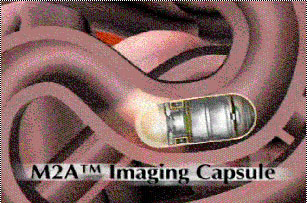In October 2000, the company raised $30 million on a post money
valuation of $75 million. That round of financing was led by US-based
venture fund OrbiMed Advisors LLC, which invested in $15 million
worth of equity. Other Given shareholders include OrbiMed 20%,
Discount Investment Corporation 16%, Elron Electronic Industries and
RDC -- the Rafael Development Corporation.
The patented M2A Imaging Capsule holds great promise in the diagnosis
and healing of gastro intestinal disorders.
GIVEN IMAGING (GIVEN is an acronym for GastroIntestinal Video
Endoscopy), since itsfounding has intensively pursued and achieved
the goal of miniaturizing a video camera and encapsulating it so that
it could be swallowed, traverse smoothly through the digestive tract
and then be naturally excreted. Currently, the broadly used method
for gastrointestinal diagnostics is endoscopy, which uses flexible
scopes inserted through the mouth or rectum. Typically the length of
a gastroscope exceeds 2.5 meter. Most patients, whose physicians
suspect ulcerations, lesions, tumors, Crohn's disease, inflammatory
bowel disease (IBD) and irritable bowel syndrome (IBD) undergo
endoscopic procedures, which most individuals find stressful due to
patient discomfort and the need for sedation.
How does it work? The procedure is simple. The patient swallows the
capsule. A wireless recorder equipped with sensor arrays, worn on a
belt around the waist receives signals transmitted by the capsule.
The use of the belt allows users to continue their daily activities
as they undergo the "GI" examination". Any conventional PC equipped
with Given's proprietary RAPID (Reporting and Processing of Images
and Data) software, produces a short video clip of the small
intestine. The workstation allows the viewing, editing and archiving
of the video and the saving of individual images and short video
clips. These in turn may be e-mailed for further diagnostic
evaluation. The proprietary software is very sophisticated and
provides features such as the ease of intensive viewing of the
digital video clip, which has a backward and forward feature. Still
pictures, can of course be studied. The video clip is downloaded into
a conventional computer. The GI specialist who receives the video can
review it for easy examination. The biggest market for Given
Imaging's M2A Imaging Capsule is the US, where between 60 to 70
million people are affected by gastrointestinal diseases. More than
10 million endoscopic procedures are performed yearly and according
to the National Institute of Health the annual cost of the
gastrointestinal disease is more than $100 billion.
 Globes, a leading Hebrew language financial daily reported that Given
Imaging is being prepared for Public Offering on Nasdaq, in the
second quarter of 2001. According to the report the firm plans to
raise $70 million, based on a pre-funding valuation of $280 million.
Lehman Brothers is the lead underwriter for the IPO, Credit Suisse
and Robertson Stephens will also take part. Given Imaging's CEO and
founder, Dr. Gavriel Meron would not comment other than to say, that
the information did not originate with the company.
Given Imaging was founded in 1998 and is located in Yokneam, Israel.
It developed Gastrointestinal Video Endoscopy, which is a minimally
invasive, disposable imaging capsule, for diagnosing small intestine
disorders and diseases. Once the patient swallows the pill-size
camera (complete with battery, lighting, lens and transmitter), it
transmits intestinal images back to the diagnosing physician. After
receiving FDA authorization for clinical trials, the company is a
waiting for marketing approval. Given Imaging hopes to begin selling
its product in the current quarter.
Globes, a leading Hebrew language financial daily reported that Given
Imaging is being prepared for Public Offering on Nasdaq, in the
second quarter of 2001. According to the report the firm plans to
raise $70 million, based on a pre-funding valuation of $280 million.
Lehman Brothers is the lead underwriter for the IPO, Credit Suisse
and Robertson Stephens will also take part. Given Imaging's CEO and
founder, Dr. Gavriel Meron would not comment other than to say, that
the information did not originate with the company.
Given Imaging was founded in 1998 and is located in Yokneam, Israel.
It developed Gastrointestinal Video Endoscopy, which is a minimally
invasive, disposable imaging capsule, for diagnosing small intestine
disorders and diseases. Once the patient swallows the pill-size
camera (complete with battery, lighting, lens and transmitter), it
transmits intestinal images back to the diagnosing physician. After
receiving FDA authorization for clinical trials, the company is a
waiting for marketing approval. Given Imaging hopes to begin selling
its product in the current quarter.